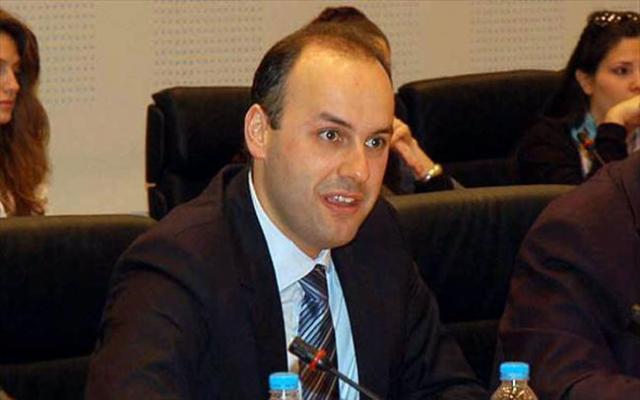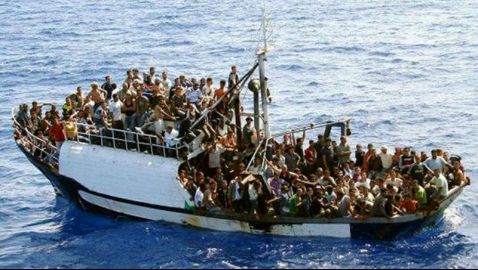Photo: Ethnos
Victoria Mindova
Two years ago, around 410 illegal immigrants a day were crossing the land border between Greece and Turkey in Evros. As a result of stricter border controls, the number of illegal immigrants who are crossing the border at the same place does not exceed three per week as shown by the data that George Papanikolaou, a Member of the European Parliament and of New Democracy in charge of the issues of poverty and illegal immigration, has presented to GRReporter.
 Despite the significant improvement of the situation in Evros, Greece still has serious problems with illegal immigration. In 2010 and 2011, the authorities found out that 150,000 illegal immigrants had entered the country. This number was slightly lower in 2012, primarily due to the stricter control in Evros. Nevertheless, a large number of illegal immigrants from third countries had entered Europe by sea. The countries of southern Europe have been receiving for decades now over 90% of the immigrant influx from third countries.
Despite the significant improvement of the situation in Evros, Greece still has serious problems with illegal immigration. In 2010 and 2011, the authorities found out that 150,000 illegal immigrants had entered the country. This number was slightly lower in 2012, primarily due to the stricter control in Evros. Nevertheless, a large number of illegal immigrants from third countries had entered Europe by sea. The countries of southern Europe have been receiving for decades now over 90% of the immigrant influx from third countries.
Dublin II
The Dublin Regulation (Dublin ΙΙ) was adopted at European level in 2003 but it turns out that it protects only the northwest part of the continent from the influx of illegal immigrants from Africa and the problematic areas in the Middle East. Under the Dublin Regulation, the member states are obliged to take unilateral responsibility for any application for asylum submitted by illegal immigrants.
The Regulation stipulates that an illegal immigrant is entitled to submit only one application for asylum only in the particular European Union country which he or she has entered first. If the authorities of another member state apprehend the illegal immigrant, they will extradite him or her to the country from which he or she has entered the European Union, without the right to apply to stay in the country in which he or she has been apprehended.
"In other words, if an immigrant has entered Europe in Evros and is captured in France, he or she will board a plane and will not return to his or her homeland but to the country of entrance."
Dublin III
Before the revision of the Dublin Regulation, Greece had applied for a change in Dublin II, which would allow illegal immigrants to apply for residence or asylum in the country in which they have been apprehended instead of in the country in which they had entered the European Union. All the countries of the southern periphery of the Union supported this proposal but it was not approved and included in the amendment of the Dublin III Regulation.
"Dublin III allows some minor problems to be partially solved, but our request was not accepted. In 2008, the European Commission had also proposed the suspension of the return of illegal immigrants to the countries of entrance when the number of immigrants in the specific country is very high. It had suggested that the country in which the people had been captured should consider their documents in order to partially alleviate the burden falling on the authorities of Greece and of other countries of the southern periphery of the Union. This was not accepted either. That is why the Greek government had decided to vote against Dublin III. However, the Regulation has been adopted."
Papanikolaou explains that the majority of the European governments approve and want the Regulation in its present form. The governments of Greece and Malta, MEPs from Italy, the left parties of almost all countries and representatives of Spain and France voted against it in the European Parliament.
There will be another chance to change something after two years when an assessment of the Regulation in its present form will be made. However, one thing is clear, namely that not only does the Dublin Regulation not help Greece and other border countries of Europe to fight illegal immigration from third countries but it intensifies the problem by returning the illegal immigrants to the countries of entrance.
The embassies are silent
"As you can see, the problem in Greece is serious," states Papanikolaou. The immigrant influx from Turkey to Europe via Greece is the largest because of the land border. Furthermore, Turkey has no visa requirements for citizens of Muslim countries, thus making it difficult to control the people who move from Turkey to Europe. Very often, they are undocumented and there is no clear information on the country they come from.
The situation is exacerbated by the lack of support from the embassies of the countries which, most  often, are the source of illegal immigrants in Europe - Afghanistan, Turkey, Iran, Pakistan and many others.
often, are the source of illegal immigrants in Europe - Afghanistan, Turkey, Iran, Pakistan and many others.
Even if Greece wants to return the apprehended illegal immigrants who do not qualify for political asylum to their countries, it cannot do so because the relevant embassies are not cooperative.
Bureaucracy – Europe’s black hole for immigrants
The illegal immigrants cannot be redirected to other European countries due to the restrictions imposed by the Schengen agreement and Dublin II which makes them fall into the black hole of bureaucracy. In addition, countries such as Greece, Malta, Spain and Italy have become a “parking lot” for unwanted aliens in Europe.
A large number of these people are trying to find a job in the black labour market until they save enough money to continue their journey to a country that offers better conditions and all the time they are at risk of being extradited. Some of them become victims of exploitation and abuse, as was the case in Manolada. Others become part of criminal organizations for drug dealing and prostitution in order to survive. Entire neighbourhoods in Athens, Thessaloniki, Patras and other cities of Greece have been turned into ghettos and neither the police nor the public know what is happening there.
Reception centres or camps
One of the decisions that the present Greek government had taken was the creation of regional reception centres for illegal immigrants. The measure provoked controversy in society.
"We fully understand and respect the people who want to use every legitimate opportunity to obtain a visa or right to asylum in the country. Through the reception centres, the government is trying to fight illegal immigration in order for the public peace of the citizens not to be disturbed by people who are moving illegally within the country. The centres receive the illegal immigrants to consider their case separately and to extradite those who are not eligible back to the countries from which they have come," Papanikolaou explains the objectives of the government.
Maybe the idea of establishing reception camps for illegal immigrants does not correspond to the conception of humanity of the average west European but Brussels has not opposed it.
Papanikolaou explains that there are three types of reception centres for immigrants. The first type includes reception centres that inform the immigrants about the procedures in the country and assesses the opportunities for acquisition of legal residence in the country.
The second type consists of open centres for temporary stay that shelter third-country nationals who want political asylum and need protection. These centres are open and the foreigners there can move freely. The third type of centres is intended for immigrants who are to be extradited back to the countries from which they have come and they stay at the closed centres until their documents are ready.
"There were a few signals that some centres are not working properly and the living conditions in them are not appropriate. These signals have been taken into account and the conditions have been improved or the centres have been closed. Four reception centres for immigrants have been closed over the past several months because of inadequate conditions. An example of this is the centre in Vena near Evros. As you can see, when the problem is serious there are inevitably difficulties. We are trying to close all centres that do not meet the conditions set by the law and in parallel, we are working with local government organizations to open reception centres for illegal immigrants in problematic regions."
The Member of the European Parliament stresses that the reception centres for immigrants are not permanent institutions. They are being opened in problematic areas and if the influx decreases or is under control, the centres are being closed. After strengthening the control in Evros, one of the main centres there has been closed. With the advent of summer, the influx of illegal immigrants by sea will increase and the government is preparing the establishment of new centres on the islands of Mitilini, Chios and Samos. "We determine the location of the reception centres for immigrants depending on the points of entrance."